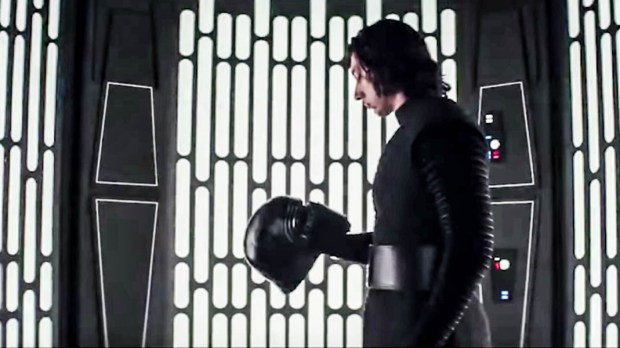Lenten Campaign 2025
This content is free of charge, as are all our articles.
Support us with a donation that is tax-deductible and enable us to continue to reach millions of readers.
[Editor’s note: This article contains mild spoilers for Star Wars: The Last Jedi.]
“I really hope they have a new villain for the last movie,” one of my friends said as we left the movie theater where we’d just seen The Last Jedi. “I can’t take Kylo Ren seriously as a real threat—he’s such a child.”
Adam Driver, who plays the Dark Side-leaning Kylo Ren in the new Star Wars trilogy, is 34, but, in the films, he seems to be much younger. Much younger than me (28), and sometimes he seemed nearly as young as 15. He’s petulant, quavering, desperate for approval. When he has a brief shirtless scene, it’s not sexy—Rey is embarrassed and asks him to cover up.
My friend was right, he’s no Darth Vader. And, the more desperate Kylo’s imitation of Vader gets, the more he reveals he agrees with my friend’s critique—he’s afraid he’s not enough of a villain, too.
So, how can a boy be a threat? Because he’s a child, or, at least, a childish man, who is wielding more power than he knows what to do with. From his tricked out triple-beamed lightsaber to the military might of the First Order, Kylo Ren has titanic powers at his command, but no real command of himself.
One of the funniest scenes in the first film of the new trilogy, The Force Awakens, comes when Kylo suffers a serious setback and begins laying waste to his own torture chamber with his lightsaber.
, about to walk past his room, hesitate, turn, and walk away rather than pass him. They don’t respect him, they’ve learned to work around him.In the new film, Kylo destroys an elevator after a talking-to from Supreme Leader Snoke, and you can imagine the tone of weary resignation the First Order facilities staff must have when they call their jackbooted handyman to restore yet another thing he’s ruined. The First Order staff, and General Hux in particular, often seem on the verge of rolling their eyes at their leader, even though they know he’s stronger than they are.
The combination of great power and great irresponsibility would be enough to make for a challenging antagonist, but Kylo Ren is more than just a boss for our heroes to defeat. He’s a reminder of what temptations we have to resist to be heroes and saints. People doing evil more often look like Kylo Ren than they look like Darth Vader.
Evil isn’t glamorous. It isn’t underscored by John Williams or versified by John Milton. It doesn’t sweep down a hallway, cape rippling, basso profundo voice booming. Evil is a privation of good, a rejection of something, and it is always a little smaller, and a little more tenuous than the whole that it gave up. Kylo Ren is chasing something that doesn’t exist, that is willfully always diminishing itself.
Andy Serkis, the actor who plays Snoke—Kylo Ren’s tempter and teacher—understands this fact and let it guide his performance. In an interview with The New York Times, he puts his finger on the paradox: “The thing about Snoke is, leaders are fearful people, because when you’re in a position of maximum power, you can only lose power. And that fear drives nearly all decisions. That fear then makes you aggressive. It makes you want to destroy others.”
Kylo Ren just wears his terror a little closer to the surface than most villains. But anyone who uses his power to strike at another reveals more than he means to about his own fear. Only someone not at home in the world, someone who feels hunted, needs other parts of the world to cease their being for him to enjoy his.
Kylo Ren makes an excellent antagonist, if not a charismatic villain, because he is the antagonist most of us will grapple with. We face temptation and cast ourselves as almost-Vaders, almost-lovely in our dark power. But, if we give way, we will be recognized by others, if not ourselves, as Kylo—made ridiculous and wrathful by our misused strengths.

